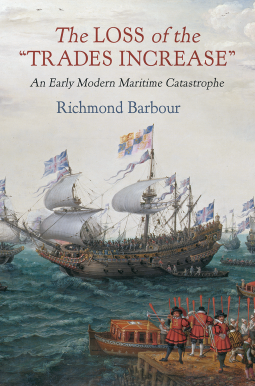
The Loss of the "Trades Increase"
An Early Modern Maritime Catastrophe
by Richmond Barbour
This title was previously available on NetGalley and is now archived.
Send NetGalley books directly to your Kindle or Kindle app
1
To read on a Kindle or Kindle app, please add kindle@netgalley.com as an approved email address to receive files in your Amazon account. Click here for step-by-step instructions.
2
Also find your Kindle email address within your Amazon account, and enter it here.
Pub Date Mar 05 2021 | Archive Date Jan 08 2021
Talking about this book? Use #TheLossoftheTradesIncrease #NetGalley. More hashtag tips!
Description
Was it the Titanic of its age?
Christened by an optimistic King James I in December 1609, the Trades Increase was the greatest merchant vessel of the Jacobean era—a magnificent ship embodying the hopes of the nascent East India Company to claim a commanding share of the Eastern trade. But the ship’s launch failed when it proved too large to exit from its dock, an ill-fated start to an expedition that would end three years later, when a dangerously leaking Trades Increase at last reached the shores of Java. While its smaller companion vessel would sail home with handsome profits for investors, the rotting hull of the great ship itself was beyond repair. The Trades Increase and nearly all who sailed it perished wretchedly on the far side of the world.
The terrible pattern proven by this voyage, with profits to an elite few in London stained by catastrophic losses in equipment and personnel abroad, ignited rancorous controversy in England over the human, moral, and economic costs of such commerce. In The Loss of the “Trades Increase,” Richmond Barbour has written an engrossing account of the tragic expedition and global capitalism at its hour of emergence.
Its sources fragmented among journals, minutes, and letters in the archives of the East India Company, the full story of the Trades Increase is told here for the first time. Earlier writers minimized the loss as a temporary setback and necessary sacrifice on the road to empire. In a work informed by corporate history and postcolonial theory, Barbour sees the saga of the voyage, and all that produced and justified it, differently: as an expression of the structural conflicts, operational risks, and material incapacities that haunted and ultimately unraveled the British Empire—and that destabilize multinational corporations, global markets, and our common biosphere to this day.
Richmond Barbour is Professor of English at Oregon State University.
Advance Praise
“Richmond Barbour has a real gift for characterization, and he’s particularly good at bringing out the motives and emotions of the men whose often unhappy and conflict-ridden lives he narrates. The Loss of the ‘Trades Increase’ is valuable as much for the insight it gives into early modern mentalities as for the well-researched account it provides.”
—David J. Baker, University of North Carolina at Chapel Hill
Available Editions
| EDITION | Other Format |
| ISBN | 9780812252774 |
| PRICE | $39.95 (USD) |
Featured Reviews
 Reviewer 186721
Reviewer 186721
I was interested in this book after coming across "Financing Whaling Ventures: A Case Study on Long Lays on Greasy Voyages" with Jonas Peter Akins.
Is the Charter of modern day project management from the Queen times? Committees do not seem to be new. Managerial negligence.
The beginning of the corporate as a body.
When you sell ships, you are powering others voyages too.
Payments is always an issue.
"Lacking a modern bank account, the company, as with Cordell above, often made payments through members who fronted their own money or credit."
History is geography
Preservation of Woods for navy ships decree. By then coal was being used in Britain for heating purposes, paving way for Renaissance too along with the The Coal Question. With coal, it was possible to make their own salt by heating unlike France which could let the sea water evaporate. If Britain wasnt a cold country, would the energy transitions have been different? How would the population growth be different? Interesting to check how different nations moved to different energy resources.
Climate Independence
From the beginning it has always been about enjoying produce of different weathers. Now we have produce all year around from different countries. Then it was spices and other things possible only in different climates.
Success of the Voyage
Long term funding, multiple voyage strategy instead of each for his own.
Different terms
strong room
near-term
Because it is a scholarly book, it is different pace alng with mnay references and quotes.



